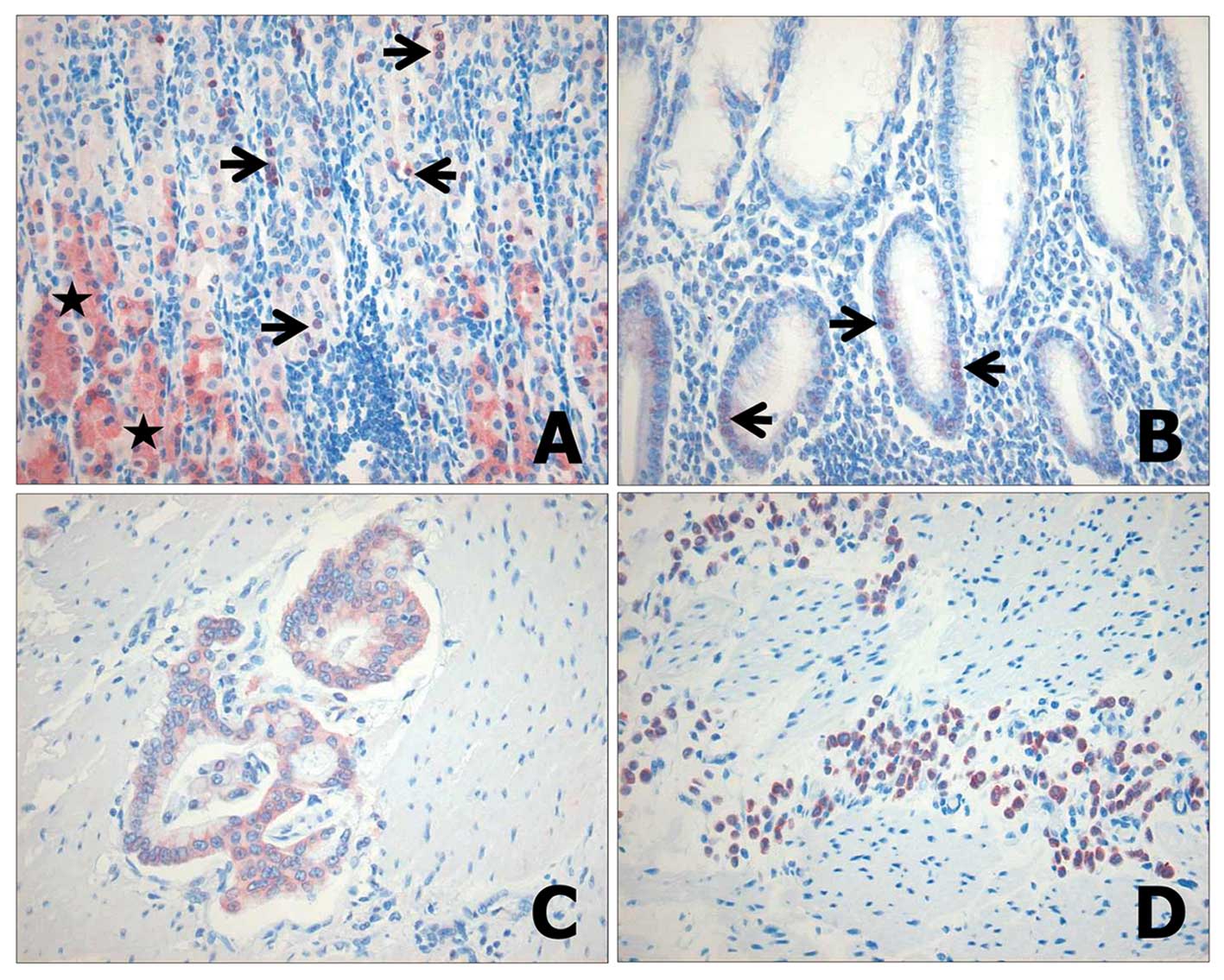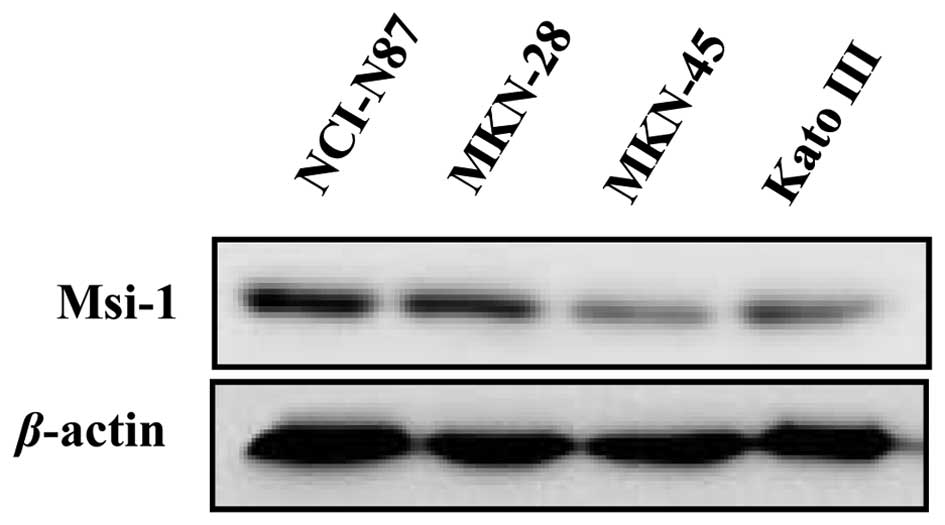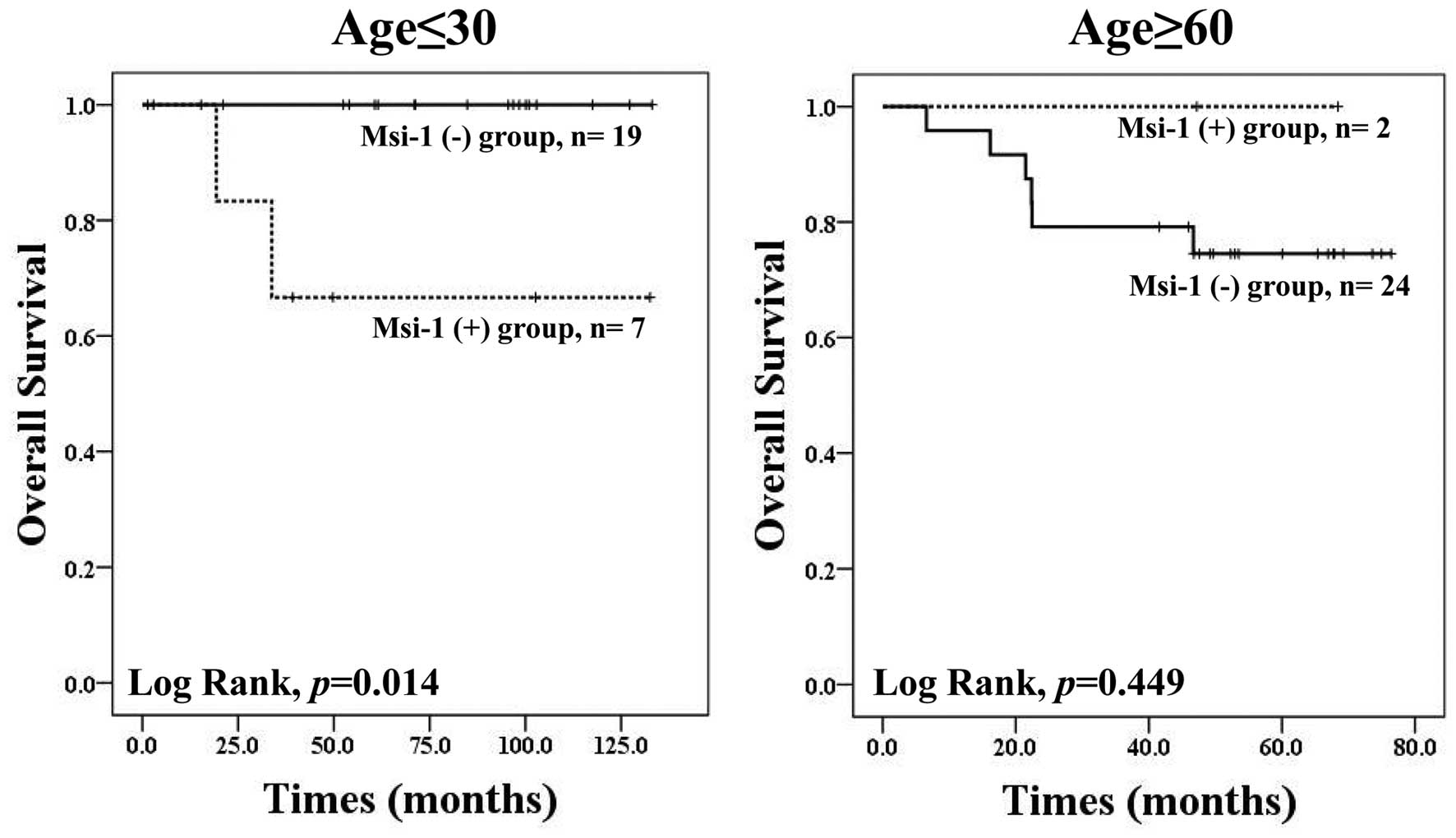|
1.
|
Jemal A, Bray F, Center MM, Ferlay J, Ward
E and Forman D: Global cancer statistics. CA Cancer J Clin.
61:69–90. 2011. View Article : Google Scholar
|
|
2.
|
Leung WK, Wu MS, Kakugawa Y, et al:
Screening for gastric cancer in Asia: current evidence and
practice. Lancet Oncol. 9:279–287. 2008. View Article : Google Scholar : PubMed/NCBI
|
|
3.
|
Bai Y and Li ZS: Endoscopic,
clinicopathological features and prognosis of very young patients
with gastric cancer. J Gastroenterol Hepatol. 26:1626–1629. 2011.
View Article : Google Scholar : PubMed/NCBI
|
|
4.
|
Nakamura R, Saikawa Y, Takahashi T, et al:
Retrospective analysis of prognostic outcome of gastric cancer in
young patients. Int J Clin Oncol. 16:328–334. 2011. View Article : Google Scholar : PubMed/NCBI
|
|
5.
|
Theuer CP, de Virgilio C, Keese G, et al:
Gastric adenocarcinoma in patients 40 years of age or younger. Am J
Surg. 172:473–476. 1996.PubMed/NCBI
|
|
6.
|
Quijano Orvananos F, Moreno Paquentin E,
Alvarez JJ, Martinez Munive A and Butron Perez L: Gastric carcinoma
in patients under 35 years. Rev Gastroenterol Mex. 64:75–77.
1999.PubMed/NCBI
|
|
7.
|
Smith BR and Stabile BE: Extreme
aggressiveness and lethality of gastric adenocarcinoma in the very
young. Arch Surg. 144:506–551. 2009. View Article : Google Scholar : PubMed/NCBI
|
|
8.
|
Saikawa Y, Fukuda K, Takahashi T, Nakamura
R, Takeuchi H and Kitagawa Y: Gastric carcinogenesis and the cancer
stem cell hypothesis. Gastric Cancer. 13:11–24. 2010. View Article : Google Scholar : PubMed/NCBI
|
|
9.
|
Clarke MF, Dick JE, Dirks PB, et al:
Cancer stem cells -perspectives on current status and future
directions: AACR Workshop on cancer stem cells. Cancer Res.
66:9339–9344. 2006. View Article : Google Scholar
|
|
10.
|
Visvader JE and Lindeman GJ: Cancer stem
cells in solid tumours: accumulating evidence and unresolved
questions. Nat Rev Cancer. 8:755–768. 2008. View Article : Google Scholar : PubMed/NCBI
|
|
11.
|
Nakamura M, Okano H, Blendy JA and Montell
C: Musashi, a neural RNA-binding protein required for
Drosophila adult external sensory organ development. Neuron.
13:67–81. 1994. View Article : Google Scholar : PubMed/NCBI
|
|
12.
|
Potten CS, Booth C, Tudor GL, et al:
Identification of a putative intestinal stem cell and early lineage
marker; musashi-1. Differentiation. 71:28–41. 2003. View Article : Google Scholar : PubMed/NCBI
|
|
13.
|
Akasaka Y, Saikawa Y, Fujita K, et al:
Expression of a candidate marker for progenitor cells, Musashi-1,
in the proliferative regions of human antrum and its decreased
expression in intestinal metaplasia. Histopathology. 47:348–356.
2005. View Article : Google Scholar
|
|
14.
|
Sureban SM, May R, George RJ, et al:
Knockdown of RNA binding protein musashi-1 leads to tumor
regression in vivo. Gastroenterology. 134:1448–1458. 2008.
View Article : Google Scholar : PubMed/NCBI
|
|
15.
|
De Sousa Abreu R, Sanchez-Diaz PC, Vogel
C, et al: Genomic analyses of musashi1 downstream targets show a
strong association with cancer-related processes. J Biol Chem.
284:12125–12135. 2009.PubMed/NCBI
|
|
16.
|
Edge SB, Byrd DR, Compton CC, Fritz AG,
Greene FL and Trotti A: AJCC Cancer Staging Manual. 7th edition.
Springer; New York: 2010
|
|
17.
|
Lauwers GY, Carneiro F, Graham DY, et al:
Gastric carcinoma. WHO Classification of Tumours of the Digestive
System. 4th edition. IARC Press; Lyon: pp. 48–58. 2010
|
|
18.
|
Lauren P: The two histological main types
of gastric carcinoma, undifferentiated and so-called
differentiated-type carcinoma. Acta Pathol Microbiol Scand.
64:31–49. 1965.PubMed/NCBI
|
|
19.
|
Eguchi T, Takahashi Y, Yamagata M,
Kasahara M and Fujii M: Gastric cancer in young patients. J Am Coll
Surg. 188:22–26. 1999. View Article : Google Scholar
|
|
20.
|
Katai H, Sasako M, Sano T and Maruyama K:
Gastric carcinoma in young adults. Jpn J Clin Oncol. 26:139–143.
1996. View Article : Google Scholar : PubMed/NCBI
|
|
21.
|
Shu HJ, Saito T, Watanabe H, et al:
Expression of the Musashi1 gene encoding the RNA-binding protein in
human hepatoma cell lines. Biochem Biophys Res Commun. 293:150–154.
2002. View Article : Google Scholar : PubMed/NCBI
|
|
22.
|
Wang T, Ong CW, Shi J, et al: Sequential
expression of putative stem cell markers in gastric carcinogenesis.
Br J Cancer. 105:658–665. 2011. View Article : Google Scholar : PubMed/NCBI
|
|
23.
|
Wang XY, Penalva LO, Yuan H, et al:
Musashi1 regulates breast tumor cell proliferation and is a
prognostic indicator of poor survival. Mol Cancer. 9:2212010.
View Article : Google Scholar : PubMed/NCBI
|
|
24.
|
Toda M, Iizuka Y, Yu W, et al: Expression
of the neural RNA-binding protein Musashi1 in human gliomas. Glia.
34:1–7. 2001. View Article : Google Scholar
|
|
25.
|
Li D, Peng X, Yan D, et al: Msi-1 is a
predictor of survival and a novel therapeutic target in colon
cancer. Ann Surg Oncol. 18:2074–2083. 2011. View Article : Google Scholar : PubMed/NCBI
|
|
26.
|
Rezza A, Skah S, Roche C, Nadjar J,
Samarut J and Plateroti M: The overexpression of the putative gut
stem cell marker Musashi-1 induces tumorigenesis through Wnt and
Notch activation. J Cell Sci. 123:3256–3265. 2010. View Article : Google Scholar : PubMed/NCBI
|
|
27.
|
Nikpour P, Emadi-Baygi M, Mohhamad-Hashem
F, Maracy MR and Haghjooy-Javanmard S: MSI1 overexpression in
diffuse type of gastric cancer. Pathol Res Pract. 209:10–13. 2013.
View Article : Google Scholar : PubMed/NCBI
|
|
28.
|
Pinto-de-Sousa J, David L, Reis CA, Gomes
R, Silva L and Pimenta A: Mucins MUC1, MUC2, MUC5AC and MUC6
expression in the evaluation of differentiation and
clinicobiological behaviour of gastric carcinoma. Virchows Arch.
440:304–310. 2002. View Article : Google Scholar
|
|
29.
|
Kim DY, Joo JK, Ryu SY, Park YK, Kim YJ
and Kim SK: Clinicopathologic characteristics of gastric carcinoma
in elderly patients: a comparison with young patients. World J
Gastroenterol. 11:22–26. 2005. View Article : Google Scholar
|

















